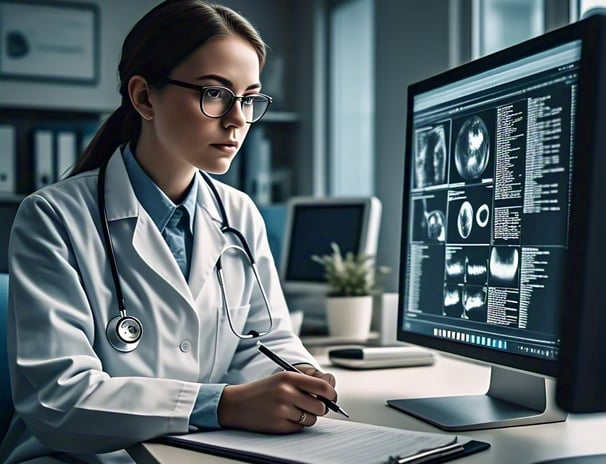AI in Diagnosing Diseases: Can Machines Be Better than Doctors?
TECHNOLOGYFEATURED


Imagine having a super-smart assistant who can look at thousands of medical images in just a few seconds and spot tiny details that even trained doctors might miss. That's what artificial intelligence (AI) is bringing to medicine! Let's explore how these amazing systems work and what they mean for healthcare.
How Does AI Learn to Spot Diseases?
Just like you learn by studying examples, AI systems learn by looking at millions of medical images and test results. For instance, if scientists want to teach AI to find skin cancer, they show it thousands of pictures of both healthy skin and skin with cancer. The AI learns to notice patterns and differences that help it tell them apart.
Think of it like teaching someone to identify birds. After seeing many pictures of robins, they learn to recognize the red breast, brown wings, and other features that make a robin a robin. AI does the same thing with medical images, but it can notice incredibly tiny details that human eyes might miss.
What Can Medical AI Do Today?
AI is already helping doctors in many exciting ways:
When doctors take X-rays of your chest, AI can help spot signs of pneumonia or lung cancer. It can examine pictures of the back of your eye to check for diabetes-related problems. Some AI systems can even listen to heart sounds and tell if something isn't quite right!
One of the most impressive things AI can do is look at skin photographs to check for melanoma, a dangerous type of skin cancer. In some studies, AI has been more accurate than experienced skin doctors at spotting early signs of this disease.
Working Together: AI and Doctors
But here's an important question: Will AI replace doctors? The answer is no! Instead, AI is like a super-powered tool that helps doctors do their jobs better. Here's why:
Doctors bring something very special that AI doesn't have: human understanding. They can talk to you about how you're feeling, understand your worries, and consider all parts of your life that might affect your health. They also know when something unusual might need a different approach.
Think of it like this: AI is like having a powerful calculator that can solve complex math problems quickly. But you still need a teacher to understand which problems need solving and to explain the results!
The Amazing Benefits
When AI and doctors work together, great things happen:
Doctors can find diseases earlier when they're easier to treat
More people in places without many doctors can get help
Doctors can spend more time talking with patients instead of studying test results
Rare diseases might be spotted more quickly because AI can check for many conditions at once
Challenges to Solve
Of course, there are some tricky problems scientists are working on:
AI needs to be fair and work well for everyone, no matter their skin color, age, or where they live. It also needs to explain its decisions so doctors can understand why it made certain choices. And like all computer systems, it needs to keep patient information private and secure.
The Future of Medical AI
Scientists are working on even more amazing ways AI could help:
Predicting health problems before they happen
Suggesting personalized treatments based on your specific genes
Helping create new medicines faster
Making robot surgeons even more precise
Fun Fact
Did you know that some AI systems can now read doctors' handwriting better than humans can? That's pretty helpful since doctors are famous for having messy handwriting!
Want to Learn More?
If you're interested in medical AI, you can:
Join coding clubs to learn how computers solve problems
Study biology to understand how the body works
Learn about statistics and patterns, which are super important in AI
Keep up with science news about new AI discoveries
Remember: The goal of medical AI isn't to replace doctors - it's to help them help us stay healthy. Maybe someday you'll help create the next big breakthrough in medical AI!
